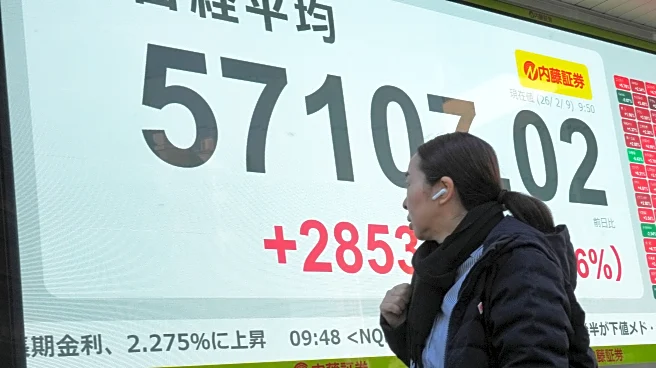What is the story about?
What's Happening?
President Trump announced a 100% tariff on Chinese imports starting next month, in response to China's tightened export rules on rare earth minerals. This move comes amid escalating tensions between the U.S. and China, with China dominating the production of rare earths, essential for various industries including automotive and technology. The announcement followed China's decision to open a monopoly investigation into U.S. tech firm Qualcomm, potentially affecting its acquisition plans. Additionally, China plans to impose new port fees on U.S.-linked vessels. The S&P 500 experienced a significant drop of 2.7% following Trump's remarks, marking its sharpest decline since April. The trade relationship between the two nations has been fragile, with previous agreements to reduce tariffs nearly halting trade.
Why It's Important?
The imposition of tariffs and export controls by the U.S. and China could have significant implications for global trade, particularly affecting industries reliant on rare earth minerals. U.S. companies, including car manufacturers like Ford, may face production challenges due to restricted access to these materials. The tech industry, especially firms like Qualcomm, could experience disruptions in their business operations and acquisition plans. The broader economic impact includes potential price increases for consumer goods and strained international supply chains. The geopolitical tension may also influence future trade negotiations and policies between the two countries.
What's Next?
The upcoming summit in South Korea presents an opportunity for further discussions between the U.S. and China. However, the likelihood of a meeting between President Trump and President Xi Jinping remains uncertain. China's new export rules are set to take effect in December, providing a window for potential negotiations. Stakeholders in the defense and technology sectors may push for diplomatic resolutions to mitigate the impact on their industries. The U.S. may need to explore alternative sources for rare earth minerals to reduce dependency on Chinese exports.
Beyond the Headlines
The ongoing trade tensions highlight the strategic importance of rare earth minerals in global politics and economics. China's leverage over these resources underscores the need for countries to diversify their supply chains and invest in domestic production capabilities. The situation also raises ethical considerations regarding the environmental impact of rare earth mining and the geopolitical risks associated with resource dependency. Long-term shifts may include increased investment in alternative technologies and materials to reduce reliance on rare earths.


















